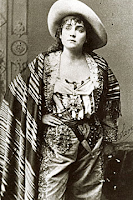CELEBRATE ADAH ISAACS MENKEN
(June 15, 1835 - August 10, 1868)
"The highest earning actress of her time."
She told so many versions of her origins, including name, place of birth, ancestry, and religion, historians have differed in their accounts. The consensus is that she was a Louisiana Creole Catholic of mixed race, with European and African ancestry.
Best known for her performance in the melodrama Mazeppa, with a climax that featured her apparently nude and riding a horse on stage, she performed it in New York, San Francisco, London and Paris.
She decided to wear her wavy hair short, an unusual style for women of the time. She cultivated a bohemian and at times androgynous appearance. The expanding media loved publicizing her "look."
In 1859 she appeared on Broadway in The French Spy. Her work was not highly regarded by the New York Times which described her as "the worst actress on Broadway".
The New York Observer said, "she is delightfully unhampered by the shackles of talent".
While in New York, she met Walt Whitman. In 1860 she wrote a review entitled "Swimming Against the Current", which praised Whitman's new edition of Leaves of Grass, saying he was "centuries ahead of his contemporaries". She identified with him and at the time for a woman to support the controversial poet was a way of declaring her bohemian identity.
ABOUT MAZEPPA
After meeting with Charles Blondin in New York who was a famed tightrope walker, she did a vaudeville tour with him. She wanted to be recognized as a great actress but her manager dissuaded her from that goal and instead offered her the "breeches role" (a man) of the noble Tartar in the melodrama Mazeppa, based on a poem by Lord Byron. At the climax of this hit, the Tartar was stripped of his clothing, tied to his horse , and sent off to his death. The audiences were thrilled with the scene, although the production used a dummy strapped to a horse, which was led away by a handler feeding it sugar cubes. Adah wanted to perform the stunt herself. Dressed in nude tights and riding a horse on stage, she appeared to be naked and caused a sensation. Playing the part of a man and playing with conventions of gender, New York audiences were shocked but still attended and made the play popular. In San Francisco audiences less concerned about convention flocked to the show and made it wildly popular. In 1862 she wrote about her public and private personae:
"I have always believed myself to be possessed of two souls, one that lives on the surface of life, pleasing and pleased; the other as deep and as unfathomable as the ocean; a mystery to me and all who know me."
Controversy arose over her costume, and she responded to critics in the newspapers of London by saying that she was influenced by classical sculpture, and that her costume was more modest than those of ballet or burlesque. The show opened October 3, 1864, at the Astley Theatre to "overflowing houses". She was so well known that she was referred to as "the Menken".
The highest-earning actress of her time, she was generous to friends, theatre people in need, and charities. While in Europe, she attracted a crowd of male admirers including such prominent figures as Charles Dickens, Tom Hood and Charles Reade. While in Paris she was delighted with her reception and had an affair with the novelist Alexandre Dumas, pere, considered somewhat scandalous as he was more than twice her age.
She fell ill in London and was forced to stop performing. Her fame and fortune dissipated quickly and she struggled with poverty. She died in Paris in 1868.
She had just written to a friend:
"I am lost to art and life. Yet, when all is said and done, have I not at my age tasted more of life than most women who live to be a hundred? It is fair, then, that I should go where old people go."
The inscription on her tomb read: "Thou knowest."




No comments:
Post a Comment